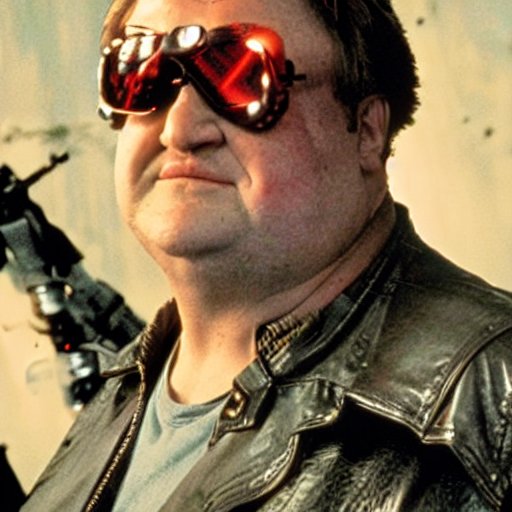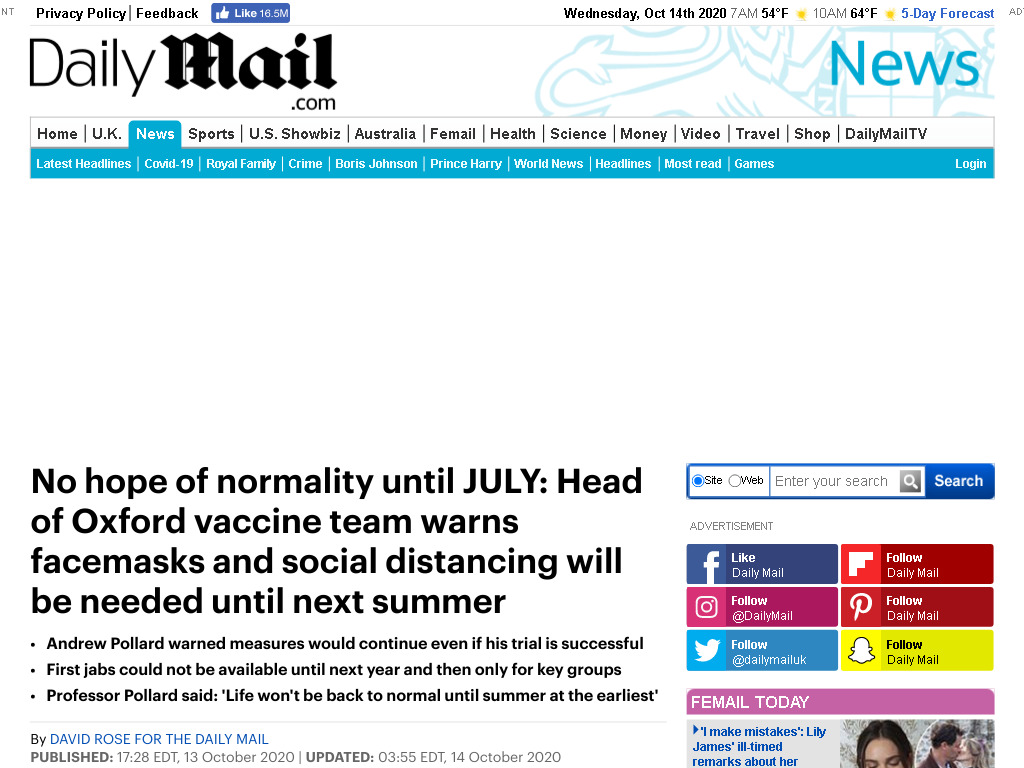Facemasks and social distancing will be needed until next summer, the head of Oxford's vaccine trial team said last night.
Andrew Pollard warned strict rules would have to be followed even if global tests proved successful. He said the first jabs would probably not be available until next year – and then only for key groups such as frontline health workers.
Professor Pollard said that he hoped the final trials could be completed by the end of this year but added: 'Life won't be back to normal until summer at the earliest. We may need masks until July.
If we end up with a vaccine that's effective in preventing the disease, that is by far the best way to control the virus. But in the medium term, we'll still need better treatments. When does life get back to normal? Even if we had enough vaccine for everyone, in my view it's unlikely that we're going to very rapidly be in a position where the physical distancing rules can be just dropped.
'Until we've got a high level of immunity in the population so that we can stop the virus so most vulnerable people are immune, there is going to be a risk. Initially, we're going to be in a position where mask-wearing and social distancing don't change.
'Only when there is a big drop in serious cases will governments feel able to relax these measures. This is a very easily transmissible virus.'
The Oxford University vaccine, produced with drugs giant Astrazeneca, is one of only nine to have reached phase three trials, the final stage before implementation, and is widely seen as the leading candidate to deliver.
In his remarks to an online seminar with Oxford alumni, Professor Pollard explained that, if successful, the vaccine will need approval from the Medicines and Healthcare products Regulatory Agency.
He said: 'Once we have the trial results, I can't imagine they will do that overnight.
'They will have to scrutinise the data very carefully – the public would not expect any less.'
The final evaluation, he said, is likely to take weeks, even though he and his team have begun a 'rolling programme' to give the regulatory agency access to the trials while in progress.
Rolling out the vaccine will pose a 'huge logistical challenge', the professor pointed out.
In his remarks to an online seminar with Oxford alumni, Professor Pollard explained that, if successful, the vaccine will need approval from the Medicines and Healthcare products Regulatory Agency.
He said: 'Once we have the trial results, I can't imagine they will do that overnight.
'They will have to scrutinise the data very carefully – the public would not expect any less.'
The final evaluation, he said, is likely to take weeks, even though he and his team have begun a 'rolling programme' to give the regulatory agency access to the trials while in progress.
Rolling out the vaccine will pose a 'huge logistical challenge', the professor pointed out.
Oxford's vaccine is based on a genetically engineered type of coronavirus that gives chimpanzees a form of the common cold.
Trials of the jab involve 20,000 volunteers in Britain and other countries being given either the vaccine or a harmless placebo.
Professor Pollard said early results had shown that the vaccine causes the body to make antibodies against Covid, and that these last for at least three months.
Tests on volunteers given the jab in April will soon show whether they lasted for six months. 'The evidence so far in the lab is that the antibodies are able to stop the virus in its tracks,' said Professor Pollard.
At least one person in the trial has become seriously ill, and has had to be hospitalised with the disease, he added.
Kate Bingham, head of the UK Vaccine Taskforce, said there was only a 'slim' chance the Oxford jab could be ready by Christmas.
She said she felt optimistic from the data seen so far in trials. But she warned against assuming a Covid-19 vaccine would be better than flu jabs, which are only around 50 per cent effective.
'It's most likely that it'll be next year,' she added.



Lol yup. Start talking to them about the problems we are going to face from the declining rate of profit like I have and they might lock you up and throw away the key.
Ah sorry, I'm ESL so sometimes not always sure what some things are referring to. What do you mean by declining rate of profit? Like just the market getting bad again?
The tendency of the rate of profit to decline is a Marxian economic concept. Basically the consistent crises capitalism faces every 5-7 years is a result of the rate of profit declining. It has been getting worse since the last 1970’s and instead of fixing the structures of capitalism they inflate bubbles in order to forestall the terminal crisis of capitalism. 2008 should have been it but they put it off another decade. Go check out this blog https://thenextrecession.wordpress.com/2020/09/13/the-us-rate-of-profit-before-the-covid/
Ah I see! Sorry, I've read a lot of the theory in different language, so maybe the translations didn't 100% line up. I get what you mean now, thank you so much.
deleted by creator